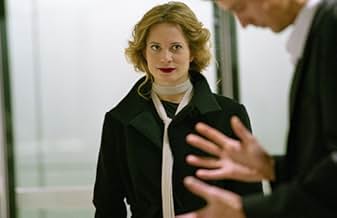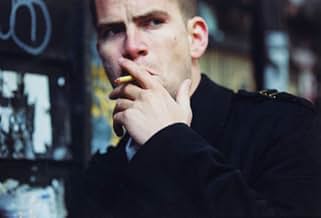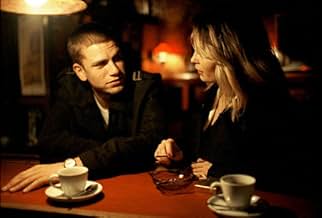CALIFICACIÓN DE IMDb
7.3/10
7.7 k
TU CALIFICACIÓN
Agrega una trama en tu idiomaA young man who thought himself already in love with a nice girl is drawn into a literary drama when he is captured by a deep and stimulating love affair.A young man who thought himself already in love with a nice girl is drawn into a literary drama when he is captured by a deep and stimulating love affair.A young man who thought himself already in love with a nice girl is drawn into a literary drama when he is captured by a deep and stimulating love affair.
- Dirección
- Guionistas
- Elenco
- Premios
- 12 premios ganados y 11 nominaciones en total
Carlos Claro Schelin
- Mercedes Sand
- (as Mercedes Claro Schelin)
Line Søndergaard Poulsen
- Girl in metro station
- (sin créditos)
- Dirección
- Guionistas
- Todo el elenco y el equipo
- Producción, taquilla y más en IMDbPro
Opiniones destacadas
Is this a true, fictional narrative, or is it the figment of the fictional writer's imagination? If that sounds contradictory, then it gives you some inkling about the substance or lack thereof of this most confusing and yet most intriguing film.
Is this a film about filming a narrative? Is it a film about two narratives one real fiction, one imaginary fiction? Or, is it simply a film designed to act as a metaphor for the total uncertainty about human relationships? Perhaps, it's all three... or simply an illusion?
As it unfolds, we meet a very confused young man, Alex (Nikolaj Lei Kaas) who seems to be in love with the same woman who exists in two different realities and, yet, who co-exist in the same city. On the one hand, Alex is associated with Simone (Maria Bonnevie) definitely and yet, he meets another woman, Aimee (again, Maria Bonnevie), who looks exactly like Simone, in another part of town.
Whereas Simone is definitely single, Aimee is apparently married to August, a writer who is in town to give some lectures on the art of writing. At the same time, August is also trying to finish his novel that is a love story, but he's having trouble trying to decide what "the young man" of his story should do and he tells Aimee about his dilemma while they sit in their hotel room.
So, while August is discussing the progress of his narrative with his publisher, Monica (Ida Dwinger), young Alex is roaming all over the city trying to understand how it is that both women appear to know him for some of the time, and at other times, he appears to be a stranger to them. Frantically, he rushes from café, to a bar, to a restaurant, to another bar, desperately trying to come to grips with his concept of his reality which, oddly enough, doesn't appear to jive with the reality of anybody that Alex thinks he knows...
Totally confused now? Well, you should be, because I think Reconstruction is an experimental film that tries to show just how confusing every person's sense of their own reality must be not only for each person, but to others around them also.
You think you really, really know your girlfriend, your wife, your boyfriend, your husband, your lover? This film, I think, forces you to reflect (no pun intended) upon that existential problem, a very real problem for every living person, whether or not we know it. The camera work is also experimental, and some of it is quite original in its construction. You'll know what I mean when you see it that is, if you're prepared to watch it.
Definitely not a film for action fans or the 'braindead'.
Is this a film about filming a narrative? Is it a film about two narratives one real fiction, one imaginary fiction? Or, is it simply a film designed to act as a metaphor for the total uncertainty about human relationships? Perhaps, it's all three... or simply an illusion?
As it unfolds, we meet a very confused young man, Alex (Nikolaj Lei Kaas) who seems to be in love with the same woman who exists in two different realities and, yet, who co-exist in the same city. On the one hand, Alex is associated with Simone (Maria Bonnevie) definitely and yet, he meets another woman, Aimee (again, Maria Bonnevie), who looks exactly like Simone, in another part of town.
Whereas Simone is definitely single, Aimee is apparently married to August, a writer who is in town to give some lectures on the art of writing. At the same time, August is also trying to finish his novel that is a love story, but he's having trouble trying to decide what "the young man" of his story should do and he tells Aimee about his dilemma while they sit in their hotel room.
So, while August is discussing the progress of his narrative with his publisher, Monica (Ida Dwinger), young Alex is roaming all over the city trying to understand how it is that both women appear to know him for some of the time, and at other times, he appears to be a stranger to them. Frantically, he rushes from café, to a bar, to a restaurant, to another bar, desperately trying to come to grips with his concept of his reality which, oddly enough, doesn't appear to jive with the reality of anybody that Alex thinks he knows...
Totally confused now? Well, you should be, because I think Reconstruction is an experimental film that tries to show just how confusing every person's sense of their own reality must be not only for each person, but to others around them also.
You think you really, really know your girlfriend, your wife, your boyfriend, your husband, your lover? This film, I think, forces you to reflect (no pun intended) upon that existential problem, a very real problem for every living person, whether or not we know it. The camera work is also experimental, and some of it is quite original in its construction. You'll know what I mean when you see it that is, if you're prepared to watch it.
Definitely not a film for action fans or the 'braindead'.
In Copenhagen, the photographer Alex (Nicolaj Lie Kaas) is the boyfriend of Simone (Maria Bonnevie) and the Swedish painter Aimee (Maria Bonnevie) is the wife of the writer August Holm (Krister Henriksson). When Alex meets Aimee in a bar, they have one night stand and falls in love for each other. However, on the next days, Alex is forgotten by his girlfriend and friends, and sees his world vanishing and his romance with Aimee re-initiating.
"Reconstruction" is an intriguing and surrealistic romance that follows the school of David lynch. All the characters are needy of love, and one possible interpretation (actually my interpretation) for the plot is that August is writing his novel inspired in the needy of his wife an muse Aimee that feels lonely with his constant absence due to his lectures and meetings with his editor Monica. He develops and affair of the character Aimme with the also fictional Alex, a man that has difficulties to commit with and believe in love, being hard for him to say "I love you" to Simone. When Alex meets Aimee, he leaves his past relationship behind but it is hard for him to believe in the love of Aimee and he loses her, and the magic of their love is never accomplished. If the viewer is seeking an original screenplay raising many questions without much explanation and open to interpretation, supported by great performances and wonderful cinematography and music score, he or she will certainly love this little gem. Last but not the least, Maria Bonnevie is a very pretty and seductive woman. My vote is eight.
Title (Brazil): "Reconstrução de um Amor" ("Reconstruction of a Love")
"Reconstruction" is an intriguing and surrealistic romance that follows the school of David lynch. All the characters are needy of love, and one possible interpretation (actually my interpretation) for the plot is that August is writing his novel inspired in the needy of his wife an muse Aimee that feels lonely with his constant absence due to his lectures and meetings with his editor Monica. He develops and affair of the character Aimme with the also fictional Alex, a man that has difficulties to commit with and believe in love, being hard for him to say "I love you" to Simone. When Alex meets Aimee, he leaves his past relationship behind but it is hard for him to believe in the love of Aimee and he loses her, and the magic of their love is never accomplished. If the viewer is seeking an original screenplay raising many questions without much explanation and open to interpretation, supported by great performances and wonderful cinematography and music score, he or she will certainly love this little gem. Last but not the least, Maria Bonnevie is a very pretty and seductive woman. My vote is eight.
Title (Brazil): "Reconstrução de um Amor" ("Reconstruction of a Love")
"Reconstruction" was an excellent movie. Some have renounced it for its little tricks. Shame on them. While the little tricks themselves weren't impressive, they contributed to the film's ideas. Maria Bonnevie was enchanting. Interestingly, when I left the theater, I felt as though I knew (and perhaps loved) Aimee even though she was a construction, a fiction about whom next to nothing was revealed. In this manner, Alex and I bonded although there is no Alex. This movie was something that viewers can feel. I loved the skepticism. I enjoyed belong dazzled by the beauty only to have it taken away. Was it ever there? There is an honesty in "Reconstruction" that is rare in cinema. This movie wasn't especially subtle in its nihilism, which was fine. Anything more subtle would have been wasted on many, maybe even me. Who knows?
"Reconstruction" is a clever, European take on "Unfaithful" where an older husband uses literary intellect instead of violence to attempt "The Revenge of the Cuckold."
But we have no idea how much is real or imagined or roman a clef or the character of the author is identifying too much with his alter ego, as we are told from the outset that what we will be seeing is the magic of the storyteller or puppeteer, watching as he manipulates his characters, trying out different situations in different drafts of a novel, erasing and playing out different scenarios of chance and choice, where art replaces the memory science of "Code 46."
I don't think I was the only audience member, however, who was rooting instead for the tall, dark, handsome young man as Nikolaj Lie Kaas has captivating chemistry with Maria Bonnevie (and I feel really foolish that I couldn't tell from either the film or the Danish credits until I looked at the IMDb listing that she plays both the jilted girlfriend and the adulterous wife).
The author makes some lame justifications about women needing love and men accidentally falling into it, or some such, that doesn't quite make sense and the film is supposed to be illustrating the point that a man has to learn about hurt as a price to be able to love. The author's self-understanding I suppose is illustrated by him reading his book's dedication to his wife in a desperate plea for her to forgive him all his inattention, etc. as he needs her for his art, so she shouldn't look for passion elsewhere.
But we're left more with the very powerful visuals of the different versions of how he imagined her possible affair could have started (a la "Brief Encounter") and its ramifications or concluded, and the feeling that the older guy was a smug deus ex machina.
In the things one can learn from the movies department: we also get a nice tour of Copenhagen-- people can smoke anywhere, even on the subway, and do, constantly; restaurant bathrooms have real terry cloth towels; the Hilton is really luxurious; Danes and Swedes don't seem to exchange cell hone numbers; and, like in "Italian for Beginners," Danes seem to think of Italy as the place to go for romance.
But we have no idea how much is real or imagined or roman a clef or the character of the author is identifying too much with his alter ego, as we are told from the outset that what we will be seeing is the magic of the storyteller or puppeteer, watching as he manipulates his characters, trying out different situations in different drafts of a novel, erasing and playing out different scenarios of chance and choice, where art replaces the memory science of "Code 46."
I don't think I was the only audience member, however, who was rooting instead for the tall, dark, handsome young man as Nikolaj Lie Kaas has captivating chemistry with Maria Bonnevie (and I feel really foolish that I couldn't tell from either the film or the Danish credits until I looked at the IMDb listing that she plays both the jilted girlfriend and the adulterous wife).
The author makes some lame justifications about women needing love and men accidentally falling into it, or some such, that doesn't quite make sense and the film is supposed to be illustrating the point that a man has to learn about hurt as a price to be able to love. The author's self-understanding I suppose is illustrated by him reading his book's dedication to his wife in a desperate plea for her to forgive him all his inattention, etc. as he needs her for his art, so she shouldn't look for passion elsewhere.
But we're left more with the very powerful visuals of the different versions of how he imagined her possible affair could have started (a la "Brief Encounter") and its ramifications or concluded, and the feeling that the older guy was a smug deus ex machina.
In the things one can learn from the movies department: we also get a nice tour of Copenhagen-- people can smoke anywhere, even on the subway, and do, constantly; restaurant bathrooms have real terry cloth towels; the Hilton is really luxurious; Danes and Swedes don't seem to exchange cell hone numbers; and, like in "Italian for Beginners," Danes seem to think of Italy as the place to go for romance.
Essentially the story of a novelist who imagines a young man, named Alex, as the protagonist of his rather existentialist novel, Reconstruction blends the joins between two separate realities (the novelist's imaginary context makes up the third). Director Christoffer Boe basically omits any detail that would add distinction to his construct, instead keeping everything vague and non-committal enough to string the audience along. The glue that holds his construction together is Maria Bonnevie, cast as Everywoman in the men's imaginations (Aimee the wife and muse of the Phillip Roth style novelist; Simone, the young protagonist's girlfriend). Ms. Bonnevie displays a subtle sense of the difference between playing a woman and playing a romanticised view of a woman. As the wife she is mostly quietly dissatisfied, as the romanticised object of affection she is often lost, promiscuous and dependent on men; her Simone is somewhat less clearly drawn but is also a bit of a red herring to the main narrative. She has a beautiful, strong featured, cinematic face that she uses to great effect with accomplished neutrality that works particularly well in this context.
While Reconstruction has some clever, sometimes startling imagery-particularly in the shadowy motif of a figure in freefall-none of the characters emerge much beyond stick figures or chess pieces in Boe's elaborate yet superficial exploration of what, one presumes, are matters of the heart. Nicolaj Lee Kaas, as Alex, makes a rather charmless protagonist; unlike Bonnevie, Kaas seems inexplicably aware of his personal reality in the context of the novelist's imagination, thus it would seem that in Boe's world view there are no romanticised notions of maleness. Kaas is compulsive and promiscuous but is never given the opportunity to explore his predicament much beyond the director's shallow concept. Boe's attempts to play the humour of his Kafkaesque, Alex in Wonderland' scenario fall flat, revealing the shaky foundation of the entire enterprise-it isn't sufficiently compelling to engage us in Alex's fate. Nor anyone else's, for that matter.
Reconstruction is most likely to appeal to younger, less experienced filmgoers for whom the bait and switch narrative techniques will seem more substantial; otherwise the film plays out with the opaqueness of an extended, overlong perfume advert. For all its elegance, the inclusion and reliance on Barber's overused Adagio feels like a major cheat; better that the narrative itself provoked an emotional response instead of the orchestra. Boe is a young filmmaker who may be one to watch but a certain maturity of purpose is in order. That said, Reconstruction is a major winner for the Copenhagen Board of Tourism.
While Reconstruction has some clever, sometimes startling imagery-particularly in the shadowy motif of a figure in freefall-none of the characters emerge much beyond stick figures or chess pieces in Boe's elaborate yet superficial exploration of what, one presumes, are matters of the heart. Nicolaj Lee Kaas, as Alex, makes a rather charmless protagonist; unlike Bonnevie, Kaas seems inexplicably aware of his personal reality in the context of the novelist's imagination, thus it would seem that in Boe's world view there are no romanticised notions of maleness. Kaas is compulsive and promiscuous but is never given the opportunity to explore his predicament much beyond the director's shallow concept. Boe's attempts to play the humour of his Kafkaesque, Alex in Wonderland' scenario fall flat, revealing the shaky foundation of the entire enterprise-it isn't sufficiently compelling to engage us in Alex's fate. Nor anyone else's, for that matter.
Reconstruction is most likely to appeal to younger, less experienced filmgoers for whom the bait and switch narrative techniques will seem more substantial; otherwise the film plays out with the opaqueness of an extended, overlong perfume advert. For all its elegance, the inclusion and reliance on Barber's overused Adagio feels like a major cheat; better that the narrative itself provoked an emotional response instead of the orchestra. Boe is a young filmmaker who may be one to watch but a certain maturity of purpose is in order. That said, Reconstruction is a major winner for the Copenhagen Board of Tourism.
¿Sabías que…?
- Citas
Narrator: It is a film. Everything is constructed. Still it hurts.
- ConexionesFeatured in Trier, Kidman og Cannes (2003)
- Bandas sonorasAdagio for Strings
by Samuel Barber
Selecciones populares
Inicia sesión para calificar y agrega a la lista de videos para obtener recomendaciones personalizadas
- How long is Reconstruction?Con tecnología de Alexa
Detalles
- Fecha de lanzamiento
- País de origen
- Idiomas
- También se conoce como
- Yeniden sev beni
- Locaciones de filmación
- Le Sommelier, Bredgade, Copenhague, Dinamarca(restaurant)
- Productoras
- Ver más créditos de la compañía en IMDbPro
Taquilla
- Total en EE. UU. y Canadá
- USD 73,516
- Fin de semana de estreno en EE. UU. y Canadá
- USD 13,629
- 12 sep 2004
- Total a nivel mundial
- USD 471,107
- Tiempo de ejecución1 hora 32 minutos
- Color
- Mezcla de sonido
- Relación de aspecto
- 2.35 : 1
Contribuir a esta página
Sugiere una edición o agrega el contenido que falta

Principales brechas de datos
By what name was Reconstruction (2003) officially released in Canada in English?
Responda

























